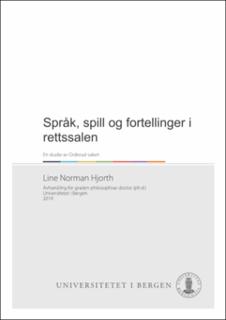Språk, spill og fortellinger i rettssalen. En studie av Orderud-saken
Doctoral thesis

Åpne
Permanent lenke
https://hdl.handle.net/1956/20513Utgivelsesdato
2019-06-14Metadata
Vis full innførselSamlinger
Sammendrag
In this thesis I seek a better understanding of the defendants speaking-situation in the courtroom. For this particular purpose I consider the lingual exchange in the courtroom as language games, and I argue this term is able to shed light on central aspects of this specific situation. The concept of language games is introduced by Ludwig Wittgenstein and his philosophy is the chief source of inspiration in this thesis. I try to show that the concept is able to illuminate how the juridical actor’s questions is part of ongoing language games performed to advance certain arguments and achieve set goals – usually to underpin or undermine the defendants credibility at specific areas. The defendant’s answers must therefore be regarded as a response to the initiated language game. The language games in the courtroom is assigned to promote or challenge different but specific narratives. In this thesis I operate with the term underlying narratives. These narratives are never, or seldom, verbalized explicitly at discourse level. Therefore, we need to regard the defendants response as a reaction to the narrative that is implied in the specific language game. I claim that these fundamental conditions affect the defendants speaking situation – and that it’s crucial to take these into consideration in order to undertake a fair assessment of their credibility, and in the end to sentence or acquit them. The courtroom setting has a very exceptional lingual practice that makes the distinction between game and speaking, introduced by Rush Rhees, relevant. I find that the lingual/legal practice in court is governed by rules, strategies and tactics that makes it resemble a game, and that this constitutes challenging conditions in terms of the defendant’s ability to get heard or acknowledged as an individual, without at the same time trying to expand or challenge the conditions that determines the language games. In my analysis of the lingual exchange in the courtroom I study the cross-examinations of four defendants in a specific Norwegian criminal case – the Orderud-case. The case is particularly interesting for the following reasons: two men and to women were convicted of the same crime but got different sentences, all four pleaded not guilty and gave different and contradictory statements about the sequence of events they were charged for, and there was no decisive forensic evidence in the case. Finally, the defendants were only charged for complicit murder. A consequence of this was that the question at stake was not if they had an alibi, but rather who they were as individuals. This meant that during the examination in court, the defendants basically had to tell the story of who they were, and their credibility became crucial. This, I argue, is dependent upon the defendant’s different capabilities for coping with the language games in court.